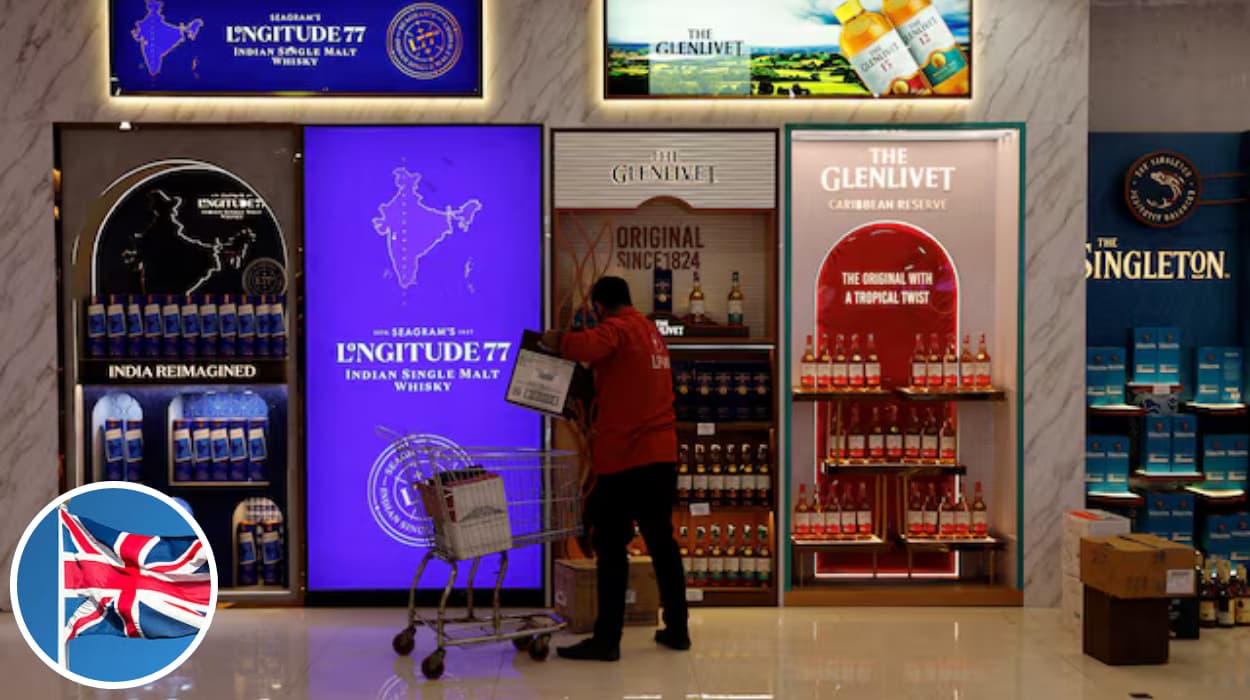Summary
- The UK has significantly reduced tariffs on Scotch whisky as part of a new trade deal.
- Despite the tariff cut, Indian distillers and exporters face limited benefits.
- Indian whisky exports to the UK market remain restricted by other regulatory and market access barriers.
- Industry experts from India express concerns over the minimal impact of the trade deal.
- The trade deal is part of the UK’s broader strategy to enhance post-Brexit trade relations.
- The deal reflects geopolitical and economic shifts affecting global whisky trade dynamics.
The UK’s recent tariff cut on Scotch whisky, while a significant move to strengthen its post-Brexit trade strategy and enhance export competitiveness, offers limited tangible benefits to Indian whisky producers. Despite the reduction in tariffs favoring Scotch, India distillers face persistent regulatory and market access barriers in the UK that curtail their ability to capitalize on the deal. Experts note that non-tariff restrictions, strict labeling rules, and differences in product definitions continue to hamper Indian whisky exports, underscoring the complex challenges beyond tariffs. This situation highlights the nuanced and often uneven impact of trade deals, where cultural and economic protections for traditional products like Scotch whisky influence the broader dynamics of global trade in spirits.
What Are the Details of the UK’s New Trade Deal on Scotch Whisky?
As the UK forges new post-Brexit trade agreements, it has agreed to a significant tariff cut on Scotch whisky. This move is designed to strengthen trade ties and reduce costs for foreign buyers of Scotch, a flagship British export. According to media outlets, the tariff reduction represents one of the largest cuts to Scotch whisky tariffs seen in recent trade negotiations, signaling the UK’s intent to position Scotch whisky advantageously in global markets.
The tariff cut aims primarily to boost UK exports by making Scotch more competitively priced abroad, especially following the economic disruptions caused by Brexit and the COVID-19 pandemic. This is a strategic effort to regain and expand market share, particularly in large consumer markets.
Why Will the Tariff Cut Bring Little Benefit to Indian Whisky Exporters?
Despite the tariff cut, Indian whisky producers and exporters remain largely unable to benefit from these changes. Industry commentary points out that while Scotch whisky gained tariff relief, Indian whisky exports continue to face significant hurdles in the UK market. According to industry analysts based in India, the regulatory framework, including strict labeling and origin requirements enforced by the UK authorities, limits Indian spirits' market penetration, regardless of tariff structures.
Additionally, the popular Indian whisky brands, often produced with different ingredients and processes than Scotch whisky, do not equally benefit from the preferential tariff structures in place for Scotch. The nuances in definition between Scotch whisky and Indian whisky under UK trade regulations create an uneven playing field.
What Do Indian Industry Experts Say About the Impact of the Trade Deal?
Indian distillers have voiced concerns about the limited advantage their sector gains from the UK’s tariff cut on Scotch whisky. A spokesperson for one of India’s leading whisky producers was quoted by expressing skepticism about the practical benefits to Indian exporters, mentioning, “The reduction in Scotch whisky tariffs by the UK will not effectively translate to increased exports for Indian whisky, as other non-tariff barriers remain firmly in place.”
The UK-India trade relationship in alcoholic beverages appears constrained not only by tariffs but by more complex market access rules, which are not adequately addressed in the current trade deal.
How Does This Fit Into the UK’s Broader Post-Brexit Trade Strategy?
The Scotch whisky tariff cut is part of the UK’s wider attempt to recalibrate its trade policy post-Brexit. With the European Union no longer the UK's dominant trade partner, the UK government has been proactively establishing bilateral trade agreements and revising existing trade terms to support British exports and imports from new partners.
According to trade experts, the Scotch whisky tariff concession reflects the UK's efforts to sustain economic momentum, especially in traditional British sectors iconic to global branding. This approach seeks to secure the UK's standing in the competitive global market by leveraging the cultural and economic cachet of Scotch whisky.
What Are the Geopolitical and Economic Implications of These Changes?
The new tariff regime also signals broader geopolitical shifts, where trade policies are increasingly used as instruments of economic diplomacy. Observers highlight that while countries like India are growing global players in whisky production, established markets like the UK remain cautious about increasing competition for their traditional products.
As reported by media, the incremental benefit to Indian whisky exporters is dampened by the UK’s protective stance on products deemed culturally significant, highlighting how trade barriers extend beyond mere tariffs into regulations that preserve national economic interests.
What Can Indian Exporters Do to Maximize Opportunities Despite These Challenges?
To navigate the limited benefits from the UK’s tariff cut, Indian exporters are advised to focus on differentiating their products through quality, branding, and targeting niche market segments. Collaborations, marketing strategies emphasizing unique Indian heritage, and lobbying for more inclusive trade terms can also be avenues to explore.
Industry experts urge policymakers in India to continue negotiations with the UK to address non-tariff barriers and to use multilateral trade forums to secure better market access for Indian whisky.
This comprehensive overview presents the latest on the UK’s tariff reductions on Scotch whisky and the impact—largely muted—on Indian whisky exports, drawing from multiple reports and expert opinions to provide a neutral and detailed analysis.

